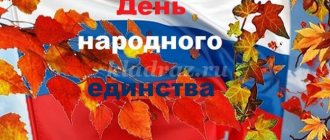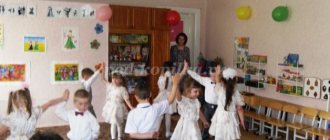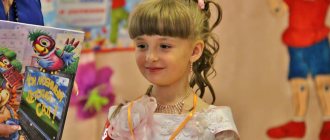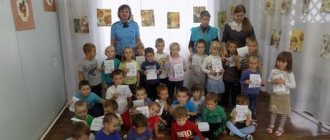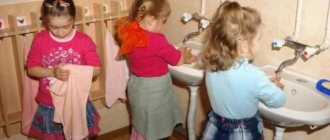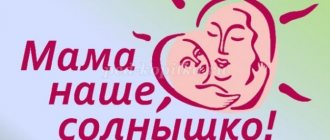Where to start celebrating the Day of Family, Love and Fidelity in kindergarten?
A holiday is not only fun, but also an educational process.
It is in kindergarten that children receive basic knowledge about family values, love, kindness and justice. Through games, competitions, and songs, children are instilled with love for their family - parents, brothers and sisters, grandparents. It is best to start a holiday in a preschool institution with the history of the holiday, which can be structured as a story for children about Peter and Fevronia of Murom - saints who are the patrons of marriage and marital love.
Project "International Family Day" in the senior group.
Municipal budgetary preschool educational institution “Kindergarten No. 8 K.V.g. Boksitogorsk"
Project
"International Family Day" in the senior group.
Performed:
Educator: Yagisheva E.V.
Boksitogorsk 2021
On May 15, Russia celebrates International Family Day.
This is a very sincere, emotional, bright, beautiful holiday! Every child loves his family, has special, reverent feelings for his parents, brothers, sisters, grandparents and relatives.
Goals:
- expand ideas about family, family traditions, the importance and role of family in a person’s life;
- provide information about the family.
Tasks:
- study the history of family development;
- find out the meaning of the word “family”;
Object of study:
- family
Introduction
Family has been the most important human value for centuries. In the traditions of different cultures, the family takes first place, it has always been customary to be proud of it, and people rely on the family in difficult moments of life.
A family is people who live together and take care of each other.
According to the classic definition of one of the leading English sociologists, Anthony Giddens, a family is understood as “a group of people connected by direct family relationships, the adult members of which assume responsibility for caring for children.”
In Russian, the word family comes from the Slavic Šeima, which is of Indo-European origin. The word “family” is based on the same root “zem” as in the word “Earth,” which indicates the territorial community of residence of family members.
Currently, the family is the basic unit of society. It is the family that gives its child an initial idea of the world, educates him, and strives to ensure that the children in the family grow up as worthy citizens of society. May 15 is International Day of Families, established by the UN General Assembly in 1993. The establishment of this day is intended to draw the attention of the public in different countries to the numerous problems of the family. In Russia and throughout the country, it has been celebrated since 1994, and has become widely known. Therefore, the topic I have chosen is considered relevant.
From the history of family creation
Scientists have given an explanation of how the family appeared in ancient times. They believe that it was created by male breadwinners with their faithful companions. The history of the family began at a certain stage of development. Ancient women understood that relationships with someone who was able to provide food not only for themselves, but also for their chosen one, were much more comfortable. This is how families began to be created.
The meaning of the word "family"
In Sergei Ivanovich Ozhegov’s dictionary, family is:
- this is a group of close relatives living together;
- a union of people united by common interests.
In the dictionary of Dmitry Nikolaevich Ushakov, family is:
- a group of people consisting of parents, children, grandchildren and immediate family members living together. So, a family is people who live together and take care of each other. Previously, families were always large (more than 10 people). And now there are families, both large and small.
According to V. Dahl’s dictionary, family is:
- it is a collection of close relatives living together; parents with children. A married son or married daughter living separately constitutes a different family.
- these are not just relatives living nearby. These are close people who are united by feelings, interests, ideals, and attitudes to life.
The importance of family in life
Family is the most precious thing we have. These are our mom and dad, sisters and brothers, grandparents - the people closest to us who love us, care about us, do everything to make our lives happy.
The family is the most necessary unit of society. What do we owe to family? Well, of course, because we were born. Mom and dad fell in love and started a family. This means that the main purpose of the family is for new people to appear and the human race not to disappear.
When a child is born in a family, it is a great joy and a great responsibility. His parents teach him to walk, talk, play with him, take him for walks, introduce him to the world around him. During school years, the family helps the child study. Parents and other adult family members introduce the rules of behavior in society and moral standards. They teach him to be honest, fair, respect elders, love his homeland and much more. Therefore, a family is also needed to help a child become a worthy person and citizen of his country.
But a family will not be able to give their child a full education if they do not have what they need for a normal life. Therefore, adult family members work. This means that the family is also the labor unit of society.
And of course, the family is always considered the guardian of the home and a healthy lifestyle. In the circle of family we find the warmth, sympathy, and understanding that we need. We owe this all to our family.
Proverbs about family
- Happy is he who is at home;
- The whole family is together, and the soul is in place;
- There is no need for a treasure if there is harmony in the family;
- A family that agrees and does not take grief
- Family traditions
Traditions
- this is not only what distinguishes one nation from another, but also what can unite a wide variety of people.
Family traditions of the Russian people
- the most interesting part of the history and culture of the Russian state, which introduces us to the experience of our ancestors.
Family traditions in Russia have never managed without the science of genealogy: it was a shame not to know the pedigree, and the most offensive nickname was considered “Ivan, who does not remember kinship.”
Drawing up a detailed pedigree, your family tree, was an integral part of the traditions of every family.
A long-standing Russian tradition can also be called the transfer of things that belonged to distant (and not so distant) ancestors to their descendants. For example, a great-grandmother's box or a great-grandfather's watch are family heirlooms that are stored for many years in a secluded corner of the house.
And of course, family holidays are our favorite, since the traditions of the ancient Russian feast are still strong in us.
Stage I. Joint discussion, familiarization. Interactions with students. Conversations about family: “What is family? ", "Why are families created? ", "Which family can we say is a happy family? » Children's stories about their families. Interactions with parents. Teachers' story about the Family Day project. Invite parents to update and enrich the attributes for the role-playing game “Family”. Consultation for parents “How to help children learn as much as possible about the Family Day holiday. Stage II. Development of a joint action plan. Interaction with students. Conversations: “Why do we need to learn about the holiday? ", "How can we congratulate our parents? » Interaction with parents. Invite parents, together with their children, to show creativity and take part in a master class on the application for Family Day “Family tree-heart”
You can paste photographs of family members into the center of the flowers.
Stage III. Children explore, create, talk with family, look at books, art and book exhibitions. Interactions with students. Thematic role-playing games “My Family”, individual conversations with children, designing a book exhibition with children, an art exhibition where happy families are depicted in reproductions of paintings. Learning poems and songs about family
Making the Letbook “My Family”
Productive activity - application “Family tree-heart”
Interactions with parents. Invite parents to take part in organizing a literary and art exhibition. Exhibition of creative works
The result of the project: 1. Children and parents got acquainted with the history of the Russian national holiday, 2. Ideas about a happy, pious family were formed; a desire arose to have the same family, to be a good husband or wife in the future, to raise many children. Family is happiness, love and luck,
Family means trips to the country in the summer. Family is a holiday, family dates, gifts, shopping, pleasant spending. The birth of children, the first step, the first babble, dreams of good things, excitement, trepidation. Family is work, taking care of each other, Family is a lot of homework. Family is important! Family is difficult! But it is impossible to live happily alone! Always be together, take care of love, drive away grievances and quarrels, We want your friends to say about you: How good your family is!
Conclusion
“What is a family for?” "For happiness!" Human happiness is hardly possible without family. Neither the most exciting job nor friends can give what a friendly and happy family can give. We all come from a family, and the more reliable this cradle, the stronger we ourselves are. It's no secret that cheerful, happy people come from strong, friendly families.
Thus, all the goals of my project were achieved and all tasks were completed.
Ideas for celebrating Family Day, love and fidelity in kindergarten
The symbol of the holiday is chamomile. This image gives a huge scope for creativity:
- the host at the holiday can be a methodologist or a girl in a daisy costume;
- It’s easy to decorate a hall, foyer, or even an area for an outdoor party with daisies;
- The children can be instructed to make crafts in the form of daisies using different techniques, postcards for all family members, emblems for a family team if a game is planned with the participation of family teams;
- As homework, families participating in the competition can be asked to prepare a dish and decorate it in the shape of a chamomile;
- On the petals you can write competition tasks for families or the names of gifts.
You can also celebrate the awarding of competition winners using this symbol: make a large daisy out of cardboard, and write on the petals the name of the souvenir that the family team won.
In addition to daisies, birds (pigeons) and balls, photographs provided by the children's families can be used in the design of the hall or playground. This could be a “Family Portrait” exhibition or wall newspapers prepared by each family. It is advisable to arrange an exhibition of children's drawings dedicated to relatives or family.
Events on the Day of Family, Love and Fidelity in kindergarten
Songs dedicated to family, mother, father, grandmother would be quite appropriate, as would dances in folk style. It is necessary to ensure that the family holiday does not turn into a rehash of March 8: no matter how important a mother is in a child’s life, a mother is still not a family! If a song is performed about mom, then something (a dance, for example) needs to be dedicated to dads, etc. But it is still advisable to focus on the family as a whole. In songs and dances you can play with the symbol of the holiday - the daisy.
It would be appropriate to hold family competitions and award each family in some category: “The most friendly family”, “The most creative...”, “The most cheerful...”, “The most cheerful...”, “The most mischievous...”, etc.
In the junior and middle groups, children cannot yet comprehend the essence of the holiday in full, so you should simply invite them to talk about their relatives, learn a song, make a daisy from blanks and decorate their apartment for the holiday. And in the senior and preparatory groups you can already talk about Peter and Fevronia and hold games, competitions, prepare interesting crafts and performances. Read more about the holiday scenario for Day of Family, Love and Fidelity in kindergarten.
As a creative task, you can instruct kindergarteners to read excerpts from the Tale of Peter and Fevronia of Murom or the poem “In Rus' there is a tale about...”, ask riddles or recite poems about the symbol of the holiday - the daisy, for example:
- Chamomile Paradise (“Chamomiles bloomed on the field, many, many beautiful flowers...”);
- Little sun (“Little sun on my palm, white daisy on a green leg...”).
A useful event would be a presentation of the family tree. During its preparation, children will learn about who their great-grandparents were and will clearly see how big their family is. Instead of a family tree, you can create a wall newspaper or a “Our Family” booklet.
On this day, you can tell children about family traditions and their role in the life of every family. An interesting and exciting presentation will be the presentation of the surname (what it means, where it came from, etc.), which each child will prepare and show at the holiday together with his family.
Lessons on family and family values were held in children's libraries in the city
From September 1 to 3, “Lessons on family and family values” were held in preschool and general education institutions in Komsomolsk-on-Amur. A variety of public events were held as part of the lessons. These are, first of all, colorfully designed book exhibitions: “Family is the creation of everything”, “Family is my hope and support”, “My home is my fortress”, “Family Reading Corner” and others. Inviting library workers to lessons on the first day of school has already become a tradition. In total, in the first days of September, over 30 public events were held in nine children's libraries in the city, attended by more than one thousand children of all ages. The events took a variety of forms.
For example, the “Family Traditions” holiday was held in branch No. 8 with the second and third grades of schools No. 1, No. 5, where the kids not only heard about family and family traditions. Excerpts from the works of classical writers were read out, which spoke about one of the most important moral values - respect for elders. They also spoke about the connection between generations, about the fact that there are many labor dynasties in our country. Giving examples of famous dynasties, they talked about the dynasties of Komsomolsk-on-Amur (Karevs, Chernobai, Mironovs).
At the end of the holiday, the children confirmed that preserving the memory of previous generations is very important. This is the desire of all friendly families. Branch No. 9 introduced young readers to literature dedicated to family. These are the works of L. Tolstoy, V. Oseeva, V. Krapivin, a short dictionary “Family Education”, etc. Conducting an information hour “Family is my hope and support,” librarians of branch No. 10 spoke about the history of the family, about the relationships of several generations. The story was closely connected with the history of names and patronymics, the order of family ties was explained, who was related to whom: sister-in-law, sister, daughter-in-law, brother, daughter. All this took place in the form of a game. Using multimedia, the children were shown family photographs and stories of the families of the children present. It was homework. It was interesting to listen to both adults and children, with what warmth and love they spoke about their families.
At the end of the event, library staff reviewed books using the following literature: “The Name of Your House”, V. Levi “Me and We”, V. Satir “How to Build Yourself and Your Family”, the collection “Can You Communicate”, V. Makeichik “Parents and Children”, etc. Branch No. 11 conducted lessons on family values for preschoolers in kindergartens and second grades of school No. 37. With preschoolers, the conversation about family was carried out using Russian folk tales “Geese-Swans”, “The Frog Princess” ", "Sivka-burka". Loud reading of fairy tales with discussion gave the kids the opportunity to understand the meaning of the words “family”, “respect for elders”, “love for loved ones”. At the end of the event, a theatrical performance of the fairy tale “Turnip” was shown, and children, together with adults, memorized proverbs about family and mother.
And for second-graders, a conversation about family values took place using electronic presentations based on the books by V. Oseeva “Just a Housewife”, V. Zheleznikov “About Katya” and others. Branch No. 12 conducted a family lesson “On the ocean of knowledge with the whole family” for 3-4- x classes of school No. 22. A beautifully decorated reading room with a bright colorful exhibition and statements about family and reading created an atmosphere of family comfort. Children together with their parents took part in quizzes, traveled to the Pochitayka and Otgadayka stations, and talked about their families and family pedigrees. The main thing that children and parents took away from this wonderful holiday: There will be peace and harmony in the family, there will be peace on Earth! For preschoolers , Branch No. 13 conducted the game program “A Friendly Family Together.” Small video clips were shown (songs about family, photographs of child readers, etc.). The kids listened to a review of books, took part in loud reading and discussion of books related to family and family traditions, and learned from examples of literature about kindness, love and respect for elders. This is the story of L. Tolstoy “Kostochka”, “Filippok”, the collection “Dear Mom”, E. Blaginina’s “Let’s Sit in Silence”, the collection “Poems and Stories about Mom”. Branch No. 14 a lesson on family values “Family is the creation of everything” for students in grades 4-5. During the lesson there was a fascinating conversation about family. Legends, riddles, and proverbs about the family were used, and competitions were held: “Going shopping,” “Waiting for guests,” “Mother’s helpers,” and “Big Family.” The event ended with a review of books about family and family values and traditions of our country. , Branch No. 15 conducted family lessons entitled “We are like rainbow colors and never separate” for preschoolers. With the help of Domovenok, the kids got to know the family and its household members, there was a conversation about such family concepts as well-being and tranquility, and you cannot live as a guest in the family. The children especially remembered the game “Me and My Family”, the meaning of which was about relationships in the family. The sun-shaped leaves were filled with words characterizing a strong family: hospitable, friendly, cultural. And the leaves are clouds - quarrels, resentments, misunderstandings. In the family clearing, everyone read poems together about dad, mom, grandparents. Then the librarians, together with young readers, compiled a family book. On one side are the best words for dad, and on the other side are the best words for mom. The kids happily took part in the games “Samovar” and “Cinderella”. And for children in grades 4-5, this branch hosted events “Our Respect for Family Reading” and a heart-to-heart conversation “You can’t live in a family without respect.” The heart-to-heart conversation took place with loud reading and discussion of the stories “Old Grandfather” and “Coin for Good Luck” from the collection “Commandments for Parents.” At the end of the event, the children were offered creative assignments on the topic “Why do I respect my parents?”, “What is family?” The event ended with these words from the guys: you need to love and respect each other, believe, help, and then there will be a strong, friendly family. In 2012, the Central Children's Hospital named after. M. Gorky works with students in grades 3-6 under the targeted Program of ethical and spiritual education of children “Land of Family Treasures”. Since the beginning of this year, several events have been held for children of this age, where they discussed a tolerant attitude towards others, friendship between peers, and guest etiquette. At the beginning of the school year, in September, librarians organized a class hour for third-grade children of gymnasium No. 45 and their parents. The theme was: “My home is my castle.” The children learned about the history of the origins of the family and house building (for many parents the history also turned out to be interesting and educational). The families who attended the class hour told those present about their ancestry, shared their experiences of spending family leisure time, and talked about the role and responsibilities of each family member.
Librarians spoke about family traditions abroad and in our country. In conclusion, a number of books were offered to the attention of parents and children for home reading, for organizing interesting joint leisure time for children and adults.
based on materials from the site www.kidslibrary.ru
